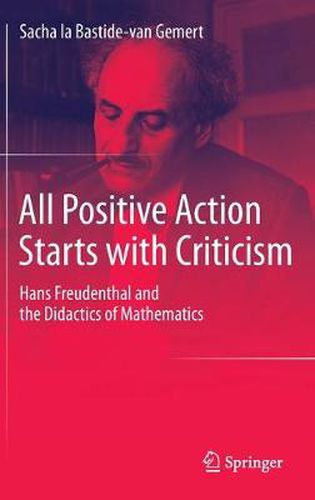Readings Newsletter
Become a Readings Member to make your shopping experience even easier.
Sign in or sign up for free!
You’re not far away from qualifying for FREE standard shipping within Australia
You’ve qualified for FREE standard shipping within Australia
The cart is loading…






This title is printed to order. This book may have been self-published. If so, we cannot guarantee the quality of the content. In the main most books will have gone through the editing process however some may not. We therefore suggest that you be aware of this before ordering this book. If in doubt check either the author or publisher’s details as we are unable to accept any returns unless they are faulty. Please contact us if you have any questions.
This study provides a historical analysis of Freudenthal’s didactic ideas and his didactic career. It is partly biographical, but also contributes to the historiography of mathematics education and addresses closely related questions such as: what is mathematics and where does it start? Which role does mathematics play in society and what influence does it have on the prevailing views concerning its accompanying didactics?.
Hans Freudenthal (1905-1990), professor in mathematics, scientist, literator, but above all mathematics-educator, was inextricably linked to the changes which took place in mathematics education and didactics during the second half of the last century. His diversity as a scientist and his inexhaustible efforts to establish the didactics of mathematics as a seriously pursued science, made Freudenthal’s influence in this area considerable. He foresaw an essential, practical role for mathematics in everyone’s life, encouraging students to discover and create mathematics themselves, instead of imposing a ready-made mathematical system. The theory of mathematics education thus developed in the Netherlands would gain world fame in the following decades.
Today, in the light of the discussions about mathematics education, in which the call for “genuine’ mathematics instead of the so-called ‘kindergarten’-mathematics can be heard, Freudenthal’s approach seems to be passe. However, the outcome of this study (which is mainly based on documents from Freudenthal’s vast personal archive) shows a more refined picture. The direct identification of ‘kindergarten’-mathematics with Freudenthal’s view on mathematics education is not justified. ‘Realistic mathematics’ as advocated by Freudenthal includes more than just a practical introductory and should, among other things, always aim at teaching ‘genuine’ mathematics in the end.
$9.00 standard shipping within Australia
FREE standard shipping within Australia for orders over $100.00
Express & International shipping calculated at checkout
This title is printed to order. This book may have been self-published. If so, we cannot guarantee the quality of the content. In the main most books will have gone through the editing process however some may not. We therefore suggest that you be aware of this before ordering this book. If in doubt check either the author or publisher’s details as we are unable to accept any returns unless they are faulty. Please contact us if you have any questions.
This study provides a historical analysis of Freudenthal’s didactic ideas and his didactic career. It is partly biographical, but also contributes to the historiography of mathematics education and addresses closely related questions such as: what is mathematics and where does it start? Which role does mathematics play in society and what influence does it have on the prevailing views concerning its accompanying didactics?.
Hans Freudenthal (1905-1990), professor in mathematics, scientist, literator, but above all mathematics-educator, was inextricably linked to the changes which took place in mathematics education and didactics during the second half of the last century. His diversity as a scientist and his inexhaustible efforts to establish the didactics of mathematics as a seriously pursued science, made Freudenthal’s influence in this area considerable. He foresaw an essential, practical role for mathematics in everyone’s life, encouraging students to discover and create mathematics themselves, instead of imposing a ready-made mathematical system. The theory of mathematics education thus developed in the Netherlands would gain world fame in the following decades.
Today, in the light of the discussions about mathematics education, in which the call for “genuine’ mathematics instead of the so-called ‘kindergarten’-mathematics can be heard, Freudenthal’s approach seems to be passe. However, the outcome of this study (which is mainly based on documents from Freudenthal’s vast personal archive) shows a more refined picture. The direct identification of ‘kindergarten’-mathematics with Freudenthal’s view on mathematics education is not justified. ‘Realistic mathematics’ as advocated by Freudenthal includes more than just a practical introductory and should, among other things, always aim at teaching ‘genuine’ mathematics in the end.